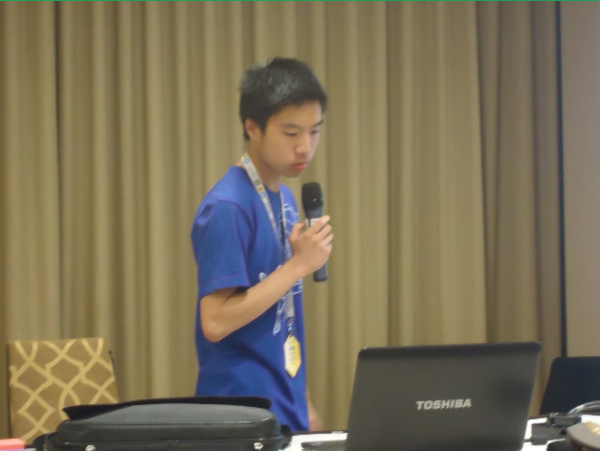Hey SUMO Nation!
 During the Work Week in London we had the utmost pleasure of hanging out with some of you (we’re still a bit sad about not everyone making it… and that we couldn’t organize a meetup for everyone contributing to everything around Mozilla).
During the Work Week in London we had the utmost pleasure of hanging out with some of you (we’re still a bit sad about not everyone making it… and that we couldn’t organize a meetup for everyone contributing to everything around Mozilla).
Among the numerous sessions, working groups, presentations, and demos we also had a SUMO Show & Tell – a story-telling session where everyone could showcase one cool thing they think everyone should know about.
I have asked those who presented to help me share their awesome stories with everyone else – and here you go, with the second one presented by Andrew, a jack-of-all-trades and Bugzilla tamer.
Take a look below and relive the origin story of a great Mozillian – someone just like you!
 It all started… with an issue that I had with Firefox on my desktop computer running Windows XP, back in 2011. Firefox wouldn’t stop crashing! I then discovered the support site for Firefox. There I found help with my issue through support articles, and at the same time, I was also intrigued by the ability to help other users through the very same site as well.
It all started… with an issue that I had with Firefox on my desktop computer running Windows XP, back in 2011. Firefox wouldn’t stop crashing! I then discovered the support site for Firefox. There I found help with my issue through support articles, and at the same time, I was also intrigued by the ability to help other users through the very same site as well.
As I looked into the available opportunities to contribute to the support team, I landed upon live chat. Live chat was a 1-on-1 chat to help out users with the issues they had. Unfortunately, after I joined the team, the live chat was placed on a hiatus. It was recommended that I move on to the forums and knowledge base, because rather than just helping one user and only them benefiting, on the forums I could help many more people through a single suggestion. For some, this floated well and with others it didn’t, because we weren’t taking care of the user personally (like on the chat).
It definitely took some time for me to adjust to this new setting, as things were (and are) handled differently on the forum and on the knowledge base. Users on the forum sometimes do respond immediately, but most of the time they respond later, and some actually don’t respond at all. This is one of the differences between helping out through live chat and through the forums.
The knowledge base on the other hand, can be really complex. There is markup being used to present text in a different way to different users. We must be as clear and precise as possible when writing the article, since although we may know really well what we are talking about, the article reader (usually a user in need of helpful information) may not. It is definitely challenging for some Mozillians to get involved with writing, but once you do, you get the hang of it and truly enjoy it.
From there on, I kept contributing to the forum and knowledge base, but I also went to find out how I could contribute to other areas of Mozilla. I landed upon triaging bugs within Mozilla sites thanks to the help of Liz Henry and Tyler Downer. Furthermore, as Firefox OS rolled out, I started to provide support to the users, write more articles and file bugs in regards to the OS.
As things moved forward so did life – at the moment I am contributing through the Social Support team. Contributing through Social helps our users on social media realise that we are listening to them and that their comments and woes are not falling on deaf ears. We respond to all types of concerns, be they praises or complaints. Helping users on Twitter while being restricted to 140 characters is difficult, whereas on Facebook we can provide a more detailed explanation and response. With Social Support, a single response from us sometimes reaches only a single person – other times it can reach thousands through re-sharing.
Social media makes it easy to identify issues, crises, and hot topics – it is where people nowadays now go to seek assistance, rant, and share their experiences. Also, as posts and tweets can spread easily on social media, it is a double-edged sword: if something positive is spreading, we hope it spreads more. However, if something negative is spreading, we must contain it, identify, and address the root cause of the issue. The bottom line is: we must help our users while keeping everything in the balance and being constantly vigilant.
 In 2013, I was very thankful that I was able to attend the Summit that was held in 3 places across the world. I was invited to Toronto, where I held a session called “What does ‘Mozillian’ mean?” In that session, we defined what the term “Mozillian” meant, who was included, not included, and what roles and capabilities were necessary to classify an individual to be a Mozillian. At the end of the session, we touched base via email to finalize our thoughts and gather the necessary information to pass along to others. Although we made some progress, defining who a Mozillian is, who can (or can’t) be one, and setting a specific criteria is somewhat impossible. We must be accepting of those who come and go, those with different backgrounds, personal preferences regarding getting things done, and (sometimes highly) different opinions. All that said, we are a huge family – a huge Mozilla family.
In 2013, I was very thankful that I was able to attend the Summit that was held in 3 places across the world. I was invited to Toronto, where I held a session called “What does ‘Mozillian’ mean?” In that session, we defined what the term “Mozillian” meant, who was included, not included, and what roles and capabilities were necessary to classify an individual to be a Mozillian. At the end of the session, we touched base via email to finalize our thoughts and gather the necessary information to pass along to others. Although we made some progress, defining who a Mozillian is, who can (or can’t) be one, and setting a specific criteria is somewhat impossible. We must be accepting of those who come and go, those with different backgrounds, personal preferences regarding getting things done, and (sometimes highly) different opinions. All that said, we are a huge family – a huge Mozilla family.
Thank you Andrew for sharing your story with us. I personally appreciate your relaxed and flexible perspective on (sometimes inevitable) changes and challenges we all face when trying to make Mozilla work for the users of the web.
Here’s to many more great chances for you to rock the (helpful, but not only) web with Mozilla and others!